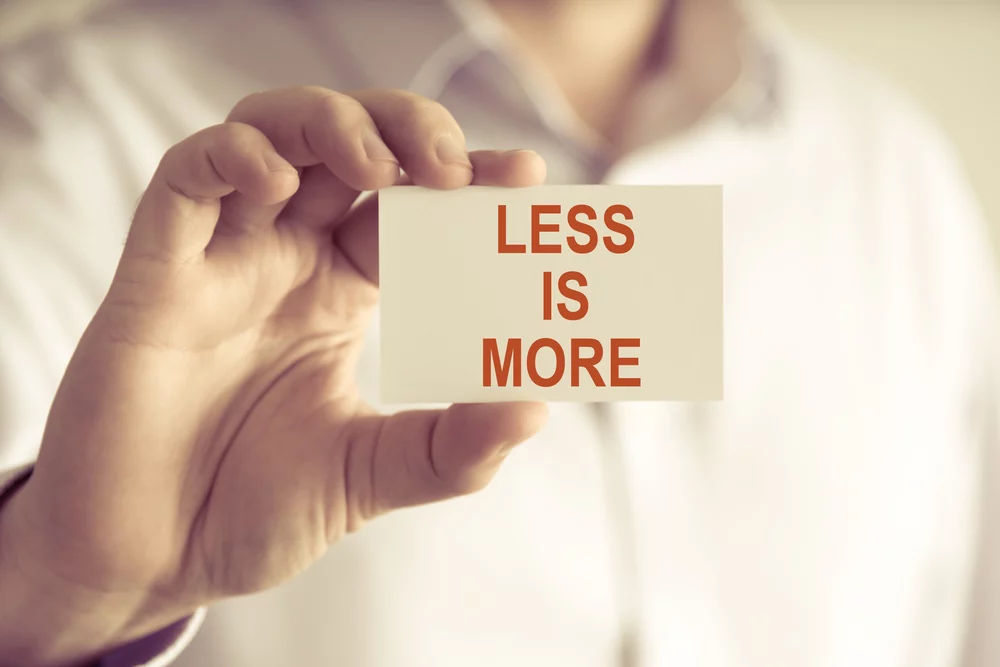Minimalist Living. It’s a concept and phrase that receives a lot of attention but also brings about a fair amount of confusion. Does it mean giving away most of your worldly possessions or creating empty spaces in your home with clean lines and soft, muted colors? It might to some and that’s OK. However, the true intention behind minimalist living is this: simplifying your life in order to bring about happiness and peace of mind. It’s a positive action that brings about another positive action and this kind of reciprocity can be achieved in different ways that include minimizing certain elements in your life while also making purposeful life choices that maximize your overall well-being.

If you were to think of minimalist or purposeful living in terms of quality over quantity, it may help you determine how to simplify your life. Examples of purposeful living that can positively impact your health and happiness include:
- Choosing to spend less time on digital devices that sap your time and energy or on social media, which at times creates stress and negativity
- Being mindful of healthy food choices or exercise activities that are enjoyable and sustainable on a weekly basis, such as hiking with a friend or loved one
- Noticing an accumulation of “things” and asking, “Do I really need this in my life?” Getting rid of mental and physical clutter can decrease your anxiety.
At the heart of this personal exchange is making the determination of what to add or take away, and the reality is that people often times must decide between purchasing material items or making purchases that gain life experiences. Yet which one brings more happiness? Surprisingly, there’s an answer. Over the course of eight studies, which all focused on the relative enjoyment of experiences and personal belongings, researchers found that there are different levels of enjoyment for both kinds of purchases. However, over time, people’s happiness with their experiential purchases, such as an evening out with friends, brought them more satisfaction than their material purchases. An experiential purchase gravitates towards connecting and sharing with others and is conducive to longer-lasting happiness.
Wiseman Health Take-Home Advice
Minimalist or purposeful living isn’t about depriving yourself; it’s about freeing yourself in ways that make your life less complicated. Much like mindful meditation, you’ll soon find there is intention behind your actions. Here are some helpful tips:
- You really only have so much bandwidth in a given day, so start by saying “yes” to the things in life that you really want to do or that matter most to you. Simply say “no” to what doesn’t.
- Find ways to reuse or repurpose what you already have.
- Make it a habit to do “spring cleaning” all year long. Gather items that you don’t need or aren’t necessary and clear them out. For example, at home, start small with cluttered drawers and then with bigger items such as clothing and shoes you don’t wear. You’ll soon find that these things are neither needed nor missed.
- Before you make a purchase, ask yourself how will the purchase add value to your life and whether it’s a need or a want. When you do make a purchase, look for something that you could donate or give away in its place rather than adding to a collection. Remember, too, that giving to others—that very real sense of thoughtful generosity—brings fulfillment and a purpose not only to you but also to someone else.
- Make it a point to limit your time on social media, smart phone, or computer so that you choose activities that foster real-time experiences with friends and family.
- Above all, don’t worry about making comparisons to others when it comes to a minimalist mindset; simply set personal goals that are right for you and bring you happiness.
Editor’s Note: This content was created by our Wiseman Health content and writing team, without the influence of artificial intelligence engines. Our goal is to be your trusted source for natural health and medical information. This article was originally published on June 26, 2023 and has since been updated.
Carter and Gilovich. (2010) The Relative Relativity of Material and Experiential Purchases. Retrieved June 20, 2018 from https://greatergood.berkeley.edu/images/application_uploads/The_relative_relativity_of_material_and.pdf
McConnell A.R. (2010, December 25). Giving really is better than receiving. psychologytoday.com.Retrieved June, 20, 2018 from https://www.psychologytoday.com/us/blog/the-social-self/201012/giving-really-is-better-receiving
Hall, A. (2017, December 06). 9 Things These People Realized When They Simplified Their Lives. huffingtonpost.com.Retrieved June 20, 2018 from https://www.huffingtonpost.com/2014/05/09/lessons-from-simplifying-_n_5287810.html
Esposito, L. (2016, December 22). Minimalism: When Living With Less Means More Mental Health. psychologytoday.com.Retrieved June, 20, 2018 from https://www.psychologytoday.com/us/blog/anxiety-zen/201612/minimalism-when-living-less-means-more-mental-health

Great advice!
Great article. Thanks it’s just what I needed